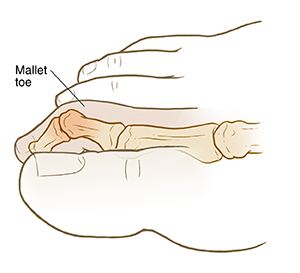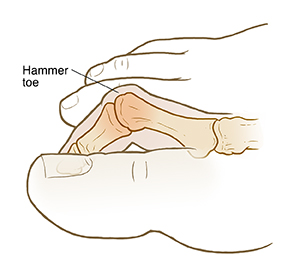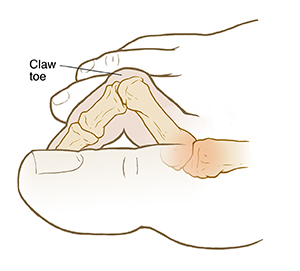A
B
C
D
E
F
G
H
I
J
K
L
M
N
O
P
Q
R
S
T
U
V
W
X
Y
Z
Click a letter to see a list of medical procedures beginning with that letter.
Click 'Back to Intro' to return to the beginning of this section.
What Are Mallet, Hammer, and Claw Toes?
Mallet, hammer, and claw toes are most often caused by wearing shoes that are too short or heels that are too high. This jams the toes against the front of the shoe and causes one or more joints to bend. Rarely, disease can cause the joints in the toes to bend. Mallet, hammer, and claw toes are among the most common toe problems. They occur most often in the longest of the four smaller toes.
Inside your toes
There are 3 bones in each of your 4 smaller toes. Where 2 bones connect is called a joint. Normally the toes lie flat. But pressure on the toes or the front of the foot can cause 1 or more joints to bend. This curls the toe. Toes that stay curled are called mallet toes, hammer toes, or claw toes, depending on which joints are bent.
 |
| With a mallet toe, the joint nearest the tip of the toe is bent. |
 |
| With a hammer toe, the middle joint is bent. |
 |
| With a claw toe, the joint at the base of the toe is bent up. The middle joint is bent down. |
Symptoms
You may feel pain in the toe or in the ball of your foot. A corn (a hard growth of skin on the top of the toe) may form where the toe rubs against the top of the shoe. Or a callus (a hard growth of skin on the bottom of the foot) may form under the tip of the toe or on the ball of the foot. Corns and calluses can also be painful.
Online Medical Reviewer:
Rahul Banerjee MD
Online Medical Reviewer:
Raymond Turley Jr PA-C
Online Medical Reviewer:
Rita Sather RN
Date Last Reviewed:
4/1/2024
© 2000-2024 The StayWell Company, LLC. All rights reserved. This information is not intended as a substitute for professional medical care. Always follow your healthcare professional's instructions.